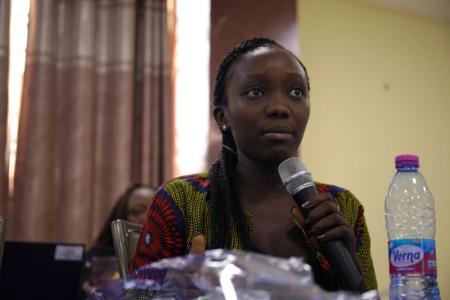
Jainaba Sonku, Programme Presenter for QTV, Gambia, speaking at the ECOWAS workshop (photo: Duncan Lukoye- DIRAJ Multimedia Centre)
By David Owino*
ACCRA, 17 December, 2019 - Young Gambian TV reporter and presenter, Jainaba Sonku, is one of a growing number of African journalists engaging in the struggle to reduce disaster risk and disaster losses across the continent.
She vowed to use her influential show Youth Dialogue on the country’s private channel QTV, “to bring the young people of Gambia into the fight for a transition for disaster response to disaster risk reduction” following her participation in a two-day workshop in Accra, Ghana, targeting journalists and representatives from DRR national platforms.
Jainaba was one of the journalists and representatives of National Platform for Disaster Risk Reduction who benefitted from a two day workshop organised by the Economic Community of West African States – (ECOWAS) Commission and the UN Office For Disaster Risk Reduction (UNDRR) in collaboration with Disaster Risk Reduction Network of Africa Journalists (DIRAJ).
The Sendai Framework for Disaster Risk Reduction, the global blueprint for reducing risk and disaster losses, was at the heart of the discussions.
Adair Ackley, UNDRR External Relations Officer, noted that “while the primary responsibility falls on governments, the Sendai Framework also recognizes the importance of other stakeholders such as the media. As DRR is everybody’s business”
According to the ECOWAS commission, cross-border flooding and droughts remain the most severe hazards in the region. In 2010, during the worst flooding experienced in the region in over 50 years, close to 200 people died. Hundreds of others have died in different flooding events across the region since then, and in 2017, over one thousand people died in Sierra Leone in a massive landslide.
ECOWAS has been making efforts to improve its technical capacity to support countries in better understanding of risk and integrating DRR in national development planning but engaging vulnerable communities remains a challenge.
“Public awareness and public education for disaster risk reduction can empower people everywhere to participate in reducing future suffering,” said Mohammed Ibrahim, Head of Humanitarian & DRR Division at ECOWAS commission.